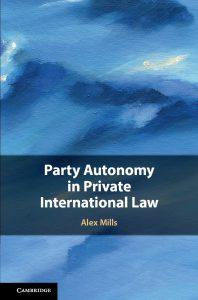The Hague Conference releases new video: “HCCH: Connecting. Protecting. Co-operating.”
/in News/by Thomas JohnBy the Permanent Bureau of the Hague Conference on Private International Law
During the solemn ceremony celebrating its 125th Anniversary, the Hague Conference on Private International Law (HCCH) launched a new video “HCCH: Connecting. Protecting. Co-operating.” In a visually appealing way, the video explains the work of the HCCH and the importance of the Organisation in a globalised world.
UK government publishes paper on future of judicial cooperation in civil matters
/1 Comment/in News/by Giesela RuehlYesterday, the UK government published new paper on the future of judicial cooperation in civil matters. It sets out the UK’s vision for the handling of civil legal cases if no Brexit deal can be reached.
The full paper is available here.
Genocide by Expropriation – New Tendencies in US State Immunity Law for Art-Related Holocaust Litigations
/in Views/by Matthias WellerOn 10 July 2018, the United States Court of Appeals for the District of Columbia Circuit rendered its judgment in the matter of Alan Philipps et al. v. the Federal Republic of Germany and the Stiftung Preussischer Kulturbesitz.
This case involves a claim by heirs of Holocaust victims for restitution of the „Welfenschatz“ (Guelph Treasure), a collection of medieval relics and devotional art housed for generations in the Cathedral of Braunschweig (Brunswick), Germany. This treasure is now on display at the Kunstgewerbemuseum Berlin (Museum of Decorative Arts) which is run by the Stiftung Preussischer Kulturbesitz. The value of the treasure is estimated to amount to USD 250 million (according to the claim for damages raised in the proceedings). Read more
Asser’s Enduring Vision: The HCCH Celebrates its 125th Anniversary
/in Views/by Mayela CelisBy the Permanent Bureau of the Hague Conference on Private International Law
On 12 September 1893, Tobias Asser, Dutch Jurist, Scholar and Statesman, realised a vision: he opened the first Session of the Hague Conference on Private International Law (HCCH). Today, exactly 125 years later, the HCCH celebrates Asser’s vision and the occasion of this First Session with a solemn ceremony in the presence of his Majesty The King Willem-Alexander of the Netherlands. Read more
Conference on European Civil Procedure, Milan 4-5 October
/in News/by Apostolos AnthimosThe Final Conference of the Jean Monnet Module on European Civil Procedure will take place in Milan on the 4th and 5th October.
Details about the event and the conference agenda can be found here.
Conference and Call: Challenge Accepted! Exploring Pathways to Civil Justice in Europe
/in News/by Xandra Kramer19-20 November 2018, Civil Justice Conference in Rotterdam – Registration is open.
As announced earlier, the conference Challenge Accepted! Exploring Pathways to Civil Justice in Europe will take place at Erasmus School of Law on 19-20 November. You are warmly invited to join us. Find the info and a call for posters below. See also our project website www.euciviljustice.eu.
Access to civil justice is of paramount importance for enforcing rights of citizens and ensuring the rule of law. Key issues in the current efforts to improve access to justice at the EU and national levels regard the digitisation of justice and the use of artificial intelligence in dispute resolution, the privatisation of justice and the multiplication of alternative dispute resolution schemes, the increased possibility of self-representation, and the ever-increasing specialisation of court systems. Each of these trends greatly influences the emerging EU civil justice system but also raises a number of questions and doubts. On 19 and 20 November 2018, policymakers, practitioners, academics from all over Europe will meet in Rotterdam to exchange and reflect on innovating pathways to civil Justice. Together, we will work on defining a sustainable framework for a 21st century EU civil justice system.
The flyer can be found here. More information about the programme and registration is available here.
Young researchers will also have the possibility to present and discuss their work during a Poster Presentation that will take place on Tuesday 20 November. Posters should focus on the topics of the conference, and show originality. We invite PhD researchers or young academics to present their research in a poster format. The three best posters will be awarded a prize during the closing cocktail.
More information on submitting a poster proposal can be found here.
This conference is organised by Erasmus School of Law at Rotterdam University under the ERC project ‘Building EU Civil Justice’ (www.euciviljustice.eu).
For more information, do not hesitate to contact us at hoevenaars@law.eur.nl (Jos) or biard@law.eur.nl (Alexandre).
The race is on: German reference to the CJEU on the interpretation of Art. 14 Rome I Regulation with regard to third-party effects of assignments
/in Views/by Matthias WellerBy Prof. Dr. Peter Mankowski, University of Hamburg
Sometimes the unexpected simply happens. Rome I aficionados will remember that the entire Rome I project was on the brink of failure since Member States could not agree on the only seemingly technical and arcane issue of the law applicable to the third-party effects of assignments of claims. An agreement to disagree saved the project in the last minute, back then. Of course, this did not make the issue vanish – and this issues concerns billion euro-markets in the financial industry. Read more
Party Autonomy in Private International Law
/in News/by Giesela Ruehl Alex Mills, University College London, has written a book on party autonomy in private international law which has just been published by Cambridge University Press. The author has kindly provided us with the following summary:
Alex Mills, University College London, has written a book on party autonomy in private international law which has just been published by Cambridge University Press. The author has kindly provided us with the following summary:
This book provides an unprecedented analysis and appraisal of party autonomy in private international law – the power of private parties to enter into agreements as to the forum in which their disputes will be resolved or the law which governs their legal relationships. Such agreements have become an increasingly important part of cross-border legal relations, but many aspects of party autonomy remain controversial and contested. This book includes a detailed exploration of the historical origins of party autonomy as well as its various theoretical justifications. It also provides an in-depth comparative study of the rules governing party autonomy in the European Union, the United States, common law systems, and in international codifications, with particular consideration of some other important jurisdictions including China and Brazil. It examines party autonomy in both choice of forum and choice of law, including arbitration agreements and choice of non-state law. It also examines the effectiveness of party choice of forum and law not only for contractual disputes, but also for a variety of non-contractual legal relations.
The book focuses its analysis around five questions of consistency in party autonomy – consistency between party autonomy in choice of forum and choice of law, consistency in the treatment of party autonomy in contractual and non-contractual relations, consistency between the choice of state and non-state forums or law, consistency between party autonomy in theory and practice, and consistency between different legal systems in relation to the effects of (and limits on) exercises of party autonomy. This analysis demonstrates that while an apparent consensus around the core principle of party autonomy has emerged, its coherence as a doctrine is open to question as there remains significant variation in practice across its various facets and between legal systems.
More information is available here.
Wanted: Research Assistant / Doctoral Student
/in News/by Giesela Ruehl I am currently looking for a research assistant / doctoral student to work at my Chair at the University of Jena as of 1 November 2018. The position is part-time (50%) and paid according to the salary scale E 13 TV-L.
I am currently looking for a research assistant / doctoral student to work at my Chair at the University of Jena as of 1 November 2018. The position is part-time (50%) and paid according to the salary scale E 13 TV-L.
In addition to writing an excellent doctoral dissertation in your field of interest (and my field of expertise) tasks associated with the position include, among others, independent teaching in German private law (contracts, torts, property: 2 hours per week in German).
The successful candidate holds an excellent first law degree and has a particular interest in private international law and international civil procedure. A very good command of German and English is required, additional languages will be an advantage.
If you are interested, please send your application (cover letter, CV, copies of relevant certificates in one pdf) to my secretary, Regina Franzl: r.franzl@recht.uni-jena.de. Deadline for applications is 14 September 2018.
The full job advert is available here (in German).


